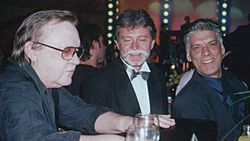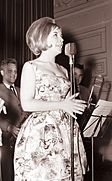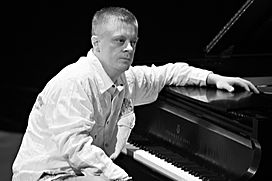Arsen Dedić facts for kids
Quick facts for kids
Arsen Dedić
|
|
|---|---|

Arsen Dedić in June 2006
|
|
| Born |
Arsenije Dedić
28 July 1938 |
| Died | 17 August 2015 (aged 77) Zagreb, Croatia
|
| Occupation |
|
| Years active | 1958–2015 |
| Spouse(s) |
|
| Children | 2 |
| Relatives | Alen Slavica (son-in-law) |
| Awards | |
| Musical career | |
| Genres | |
| Instruments |
|
| Labels |
|
| Associated acts |
Various
|
Arsenije "Arsen" Dedić (born July 28, 1938 – died August 17, 2015) was a famous Croatian singer and songwriter. He was known for writing and performing "chansons," which are a type of French song. He also created music for movies. Arsen Dedić was a talented poet too, and his poems were very popular in former Yugoslavia and Croatia.
Contents
About Arsen Dedić
Arsen Dedić was born in Šibenik, a city in Croatia. He was the second child of his parents, Veronika and Jovan Dedić. His father was a bricklayer, a volunteer firefighter, and a musician. His mother was a housewife. Arsen later taught his mother how to read and write.
He was named Arsenije after an important Serbian Archbishop. Arsen Dedić went to music school. In 1957, he moved from Šibenik to Zagreb. He first studied law at the University of Zagreb. However, he soon changed his mind and enrolled in the Music Academy of Zagreb. He finished his music studies in 1964.
Arsen Dedić became very well-known in the 1960s. This was thanks to pop music festivals and his unique style of music. His early songs were inspired by the traditional music of Dalmatia. But his music style is often compared to the French chanson genre. Over the years, Arsen Dedić became one of the most respected musicians in former Yugoslavia. He kept this great reputation until he passed away.
His Later Years
In early 2014, Arsen Dedić had a fall and found it hard to walk. He needed to use a cane. In July 2015, he had surgery on his hip because of severe pain. After the surgery, he spent two weeks recovering. On July 28, he celebrated his 77th birthday with his family and friends in Zagreb.
Later that month, he became very ill. This was likely a complication from his earlier liver transplant in 2004. He was taken to the hospital's intensive care unit. At first, he seemed to get better. But on August 13, his condition became much worse. On August 14, his lungs stopped working, and he needed a machine to help him breathe. Soon, other organs also began to fail.
Arsen Dedić passed away at the Zagreb Clinical Hospital Center on August 17, 2015. He was 77 years old. Memorial services were held for him in Šibenik and Zagreb. He was cremated and buried privately with his closest family on August 25, at the Mirogoj Cemetery in Zagreb.
Family Life
Arsen Dedić had a daughter named Sandra, born in 1962. She was from his first marriage to Vesna Suligoj. Sandra is married to Alen Slavica, who is also a popular singer. They have a daughter named Ema, born in 2011.
In 1973, Arsen Dedić married his second wife, Gabi Novak. She is a well-known Croatian pop singer. Their son, Matija, was born in the same year. Matija is now one of the most respected jazz pianists in Croatia. He also has a daughter named Lu with his wife Marina Scotti.
Arsen Dedić wrote several songs dedicated to his wife Gabi Novak. He also wrote songs for his daughter Sandra and his granddaughters, "Pjesma za Lu" and "Mata Hari." His daughter Sandra even appeared as a young girl on the cover of his 1987 album, Kino Sloboda.
Arsen Dedić loved the Hajduk Split football club. He was a member of their fan club in Zagreb. He often attended their games and performed for free at their "White Night" events. In 1967, he even put his songs on an album called Naprid bili. The money from this album helped build the new Hajduk stadium.
Music Albums
Arsen Dedić released many albums throughout his career. Here are some of them:
Albums on Vinyl Records
- "45RPM Compact Vinyl - "ZAGREB 66" XII Festival Zabavne Muzike. SANDRA - Pjeva Arsen Dedic."
- Čovjek kao ja (1969)
- Arsen 2 (1971)
- Homo Volans (double album) (1973)
- Vraćam se (1975)
- Porodično stablo (1976)
- Arsenal (1976)
- Otisak autora (1976)
- Pjesme sa šlagom (1976)
- Dedić-Golob (1977)
- Kuća pored mora (instrumentals) (1978)
- Rimska ploča (1980)
- Pjevam pjesnike (1980)
- Naručene pjesme (1980)
- Gabi i Arsen (1980)
- Carevo novo ruho (1981)
- Arsen pjeva djeci (1982)
- Provincija (1984)
- Kantautor (double album) (1985)
- Moje popevke (1986)
- Kino Sloboda (1987)
- Arsen & Bora Čorba Unplugged `87 (1987)
- Hrabri ljudi (Gabi i Arsen) (1988)
- Glazba za film i TV (1989)
- Svjedoci priče (1989)
Albums on CDs
- Najbolje od Arsena (1991)
- Tihi obrt (1993)
- Der Gesang der Narren von Europa (1995 – with Dževad Karahasan and Herbert Gantschacher)
- Ko ovo more platit (1995)
- Ministarstvo (1997) / Ministarstvo straha (2000, 2005)
- Herbar (1999)
- Čovjek kao ja (1969, 1999)
- Kino Sloboda (1987, 2000)
- Kinoteka (2002)
- Homo volans (1973, 2003)
- Imena žena (2003)
- Na zlu putu (2004)
- Ministarstvo straha (2006)
- Rebus (2008)
Poetry Books
Arsen Dedić was also a recognized poet. He published several books of poetry:
- Brod u Boci (Croatia Concert, Zagreb, 1971)
- Hotel Balkan (Znanje, Zagreb, 1987)
- 101 Pjesma (Svjetlost, Sarajevo, 1989)
See also
 In Spanish: Arsen Dedić para niños
In Spanish: Arsen Dedić para niños
 | John T. Biggers |
 | Thomas Blackshear |
 | Mark Bradford |
 | Beverly Buchanan |




